Kaizen (Continuous Improvement)

Kaizen (Continuous Improvement)
Kaizen is a combination of the Japanese words "kai" (change) and "zen" (good) and means "continuous improvement" or "continuous development". Kaizen, a term frequently used in the business world and the field of production, refers to constantly making small and undeniable changes in order to improve business processes, production and the overall efficiency of the workplace.
The basic principle of Kaizen is to achieve greater results by making small and continuous improvements rather than making large and radical changes. This approach encourages the participation of employees at all levels and believes that everyone can contribute to improving business processes. Therefore, Kaizen can be applied not only in the field of production, but also in management and non-management areas.
The main goals of Kaizen can be:
Increasing Business Efficiency: Reducing waste and using resources in the best way by making business processes more efficient.
Improving Quality: To ensure customer satisfaction by increasing product and service quality.
Reducing Costs: Reducing waste and working more efficiently can reduce costs.
Increasing Occupational Safety: Reducing occupational accidents by improving safety measures in the workplace.
Increasing Employee Participation: Encouraging employees to contribute to continuous improvement and evaluating their ideas.